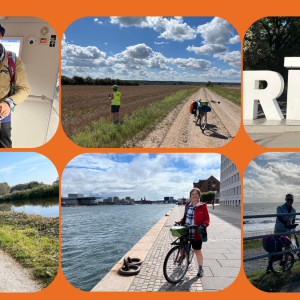Last month, during my sneak peek at the new OHSU Tram, I met an avid bike commuter named Ellen Peck. Turns out that in addition to volunteering with the OHSU Bike Commuters Group, she is also an R.N. and the clinicial research coordinator for OHSU’s Trauma Department.
Ellen told me about an interesting clinical study she was planning that would take a look at injury prevention among bike commuters in Portland. Here’s the official word from OHSU:
Ellen Peck and her colleagues are interested in finding out whether effective intervention could help reduce injuries in the bike commuter population. The proposed two-year study is just getting off the ground, and Peck is currently exploring opportunities to find support for the study.
Two other large metro-area employers with robust commuter programs will be asked to join the OHSU bike commuters group in the prospective clinical trial. Peck envisions a collaborative project with many partners.
This study should provide some interesting data. Ellen says the project is still very preliminary, so I’ll post more details as they become available.
If you have feedback or would like to know more information, feel free to leave a comment or contact Ellen at (503) 494-6517 or pecke[at]ohsu[dot]edu.







Thanks for reading.
BikePortland has served this community with independent community journalism since 2005. We rely on subscriptions from readers like you to survive. Your financial support is vital in keeping this valuable resource alive and well.
Please subscribe today to strengthen and expand our work.
I am really excited that someone will be doing research on bike safety that is not focused on helmet-wearing alone. Not that I don’t think helmets are important, but they
1. don’t prevent crashes
2. do not prevent all injury or death
3. are a sign that our streets are not very safe for cyclists (look at Dutch bikers – are they wearing helmets? no! do they have high rates of head injury? no!)
So it’s great that we’ll have more information, if this study goes forward, about how else we can make cycling safer and how we can prevent crashes, rather than focusing on the band-aid solution (helmets) alone.
It’s my understanding that the study will focus on workplace support for and education of cyclists, to see what effect that has on their injury rates. The other piece of bike safety I would really like to see emphasized more in our culture and planning is physical design of streets that causes people to drive, bike and walk more safetly, rather than simply relying on signage and enforcement to affect behavior. Anyone want to build some safe streets and do a study on that?
Thanks Ellen for taking the lead on this! Very cool!
I could not tell if the basis for this is really auto-crash related or not.
I really think that a lot of the injury’s from “Commuting” would turn out to be related to improper bicycle fit, such as seat height and stem length, and some times overt strain on certain muscles.
It seems to me these results would outweigh results from auto related, or even Self-Crash related wounds…..
What precisley do they mean by “effective intervention”? Will they get the commuters’ families and friends to confront them about their bike riding addiction or habits? God knows my family has already tried that to no effect. . . . 🙂
But in all seriousnes, what the heck does that mean?
Michelle,
I don\’t agree with you!
Wearing helmets IS very important!
My helmet saved my life when I got into serious crash this summer!